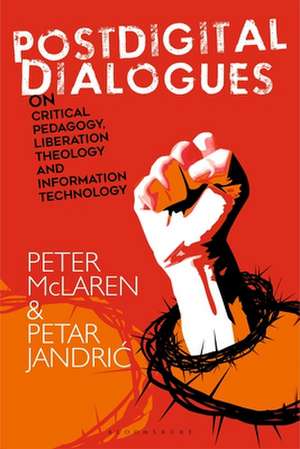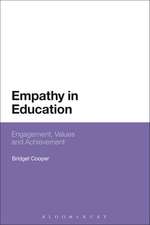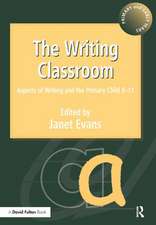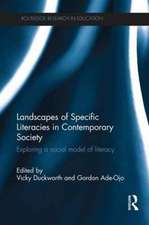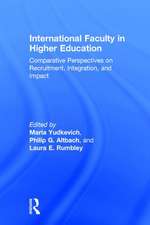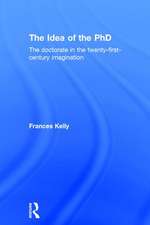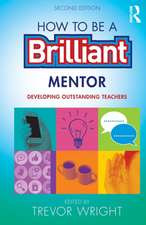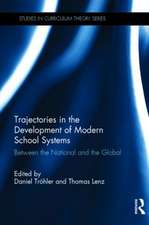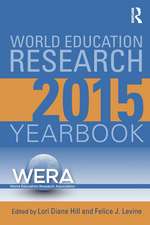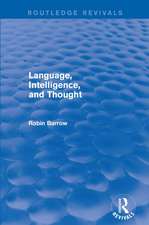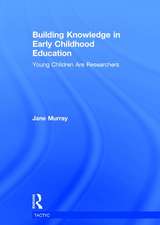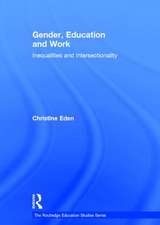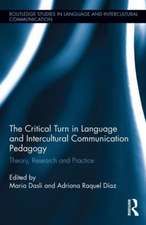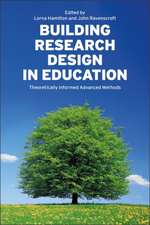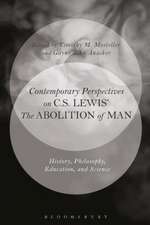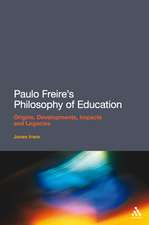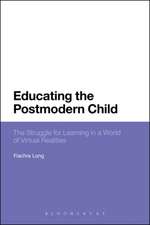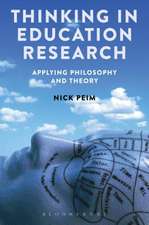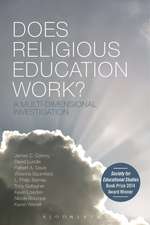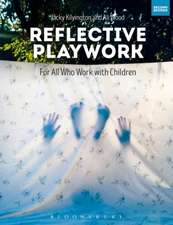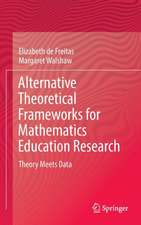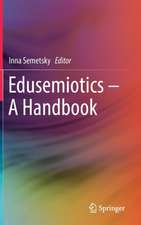Postdigital Dialogues on Critical Pedagogy, Liberation Theology and Information Technology
Autor Professor Peter McLaren, Petar Jandricen Limba Engleză Paperback – 15 apr 2020
| Toate formatele și edițiile | Preț | Express |
|---|---|---|
| Paperback (1) | 162.20 lei 22-36 zile | |
| Bloomsbury Publishing – 15 apr 2020 | 162.20 lei 22-36 zile | |
| Hardback (1) | 499.93 lei 43-57 zile | |
| Bloomsbury Publishing – 15 apr 2020 | 499.93 lei 43-57 zile |
Preț: 162.20 lei
Preț vechi: 185.84 lei
-13% Nou
Puncte Express: 243
Preț estimativ în valută:
31.04€ • 32.49$ • 25.68£
31.04€ • 32.49$ • 25.68£
Carte disponibilă
Livrare economică 17-31 martie
Preluare comenzi: 021 569.72.76
Specificații
ISBN-13: 9781350144668
ISBN-10: 1350144665
Pagini: 312
Dimensiuni: 156 x 234 x 20 mm
Greutate: 0.48 kg
Editura: Bloomsbury Publishing
Colecția Bloomsbury Academic
Locul publicării:London, United Kingdom
ISBN-10: 1350144665
Pagini: 312
Dimensiuni: 156 x 234 x 20 mm
Greutate: 0.48 kg
Editura: Bloomsbury Publishing
Colecția Bloomsbury Academic
Locul publicării:London, United Kingdom
Caracteristici
Charts Peter McLaren's insights in liberation theology developed after his major work Pedagogy of Insurrection (2015)
Notă biografică
Peter McLaren is Distinguished Professor in Critical Studies at Chapman University, USA, and Co-Director of the Paulo Freire Democratic Project and International Ambassador for Global Ethics and Social Justice. He is also Emeritus Professor of Urban Education, UCLA, USA, and Emeritus Professor of Educational Leadership, Miami University of Ohio, USA. He is also Honorary Director of the Center for Critical Studies in Education in Northeast Normal University, China. He is the author/editor of over forty books including Pedagogy of Insurrection (2015).Petar Jandric is Professor of Digital Learning and Programme Director of BSc Informatics at the Zagreb University of Applied Sciences, Croatia, and visiting Associate Professor at the University of Zagreb, Croatia. He is the author/editor of six books including The Digital University: A Dialogue and Manifesto (2018).
Cuprins
Acknowledgements Foreword, Peter Hudis (Oakton Community College, USA) Introductions1. Peter McLaren: Portrait of a Revolutionary, Petar Jandric2. Petar Jandric: Portrait of a Hunter Gatherer, Sarah Hayes Revolutionary Critical Pedagogy Meets Digital Technology3. Revolutionary Critical Pedagogy Is Made by Walking: In a World Where Many Worlds Coexist, 4. The Critical Challenge of Networked Learning: Using Information Technologies in the Service of Humanity Revolutionary Critical Pedagogy Meets Liberation Theology5. From Liberation to Salvation: Revolutionary Critical Pedagogy Meets Liberation Theology 6. Karl Marx and Liberation Theology: Dialectical Materialism and Christian Spirituality in, against and beyond Contemporary Capitalism 7. Paulo Freire and Liberation Theology: The Christian Consciousness of Critical Pedagogy Revolutionary Critical Pedagogy in, against and beyond Transnational Capitalism8. We Must Save Ourselves: Revolutionary Critical Pedagogy in, against and beyond Global Neoliberal Fascism9. We Want What Others Want: Ayn Rand, René Girard and Acquisitive Mimesis 10. Siddhartha Meeting Jesus in the Desert of the Real: Christian Ecopedagogy in and for the Anthropocene 11. Postdigital Science and Education, Petar Jandric12. Reclaiming the Present or a Return to the Ash Heap of the Future? (Peter McLaren)Afterword: After All the Words: Faith and Action, Michael A. Peters (Beijing Normal University, China) References Index
Recenzii
Postdigital Dialogues on Critical Pedagogy, Liberation Theology and Information Technology welds together biography, treatise, and analysis in service of excavating the possibilities for human liberation under the staggeringly complex conditions of a technologically saturated, ecologically ruinous state of late capitalism. Wide ranging and lucid, Peter McLaren and Petar Jandric draw on decades of research, personal experience, and critical philosophy in order to offer thought-provoking insights and practical ways forward.
This book shows the importance of critical pedagogy and liberation theology as intellectual means of struggle against digital capitalism. An essential reading for anyone interested in the advancement of socialist humanism.
If there ever was an urgent need for revolutionary critical pedagogy, it is in today's dystopian world. These inspiring dialogues between two great minds and activists are full of pertinent insights useful to navigate ourselves in the early 21st century and, hopefully, to change our today's predicament. Not constrained by typical academic conventions, this book offers a much needed subversive manual for a future worth hoping - and fighting for.
Postdigital Dialogues on Critical Pedagogy, Liberation Theology and Information Technologyis reminiscent of what Paulo Freire called "talking books", which bring two powerful authors into a direct and fluidly exchange. As such, it exemplifies the very power of dialogue, illustrating the inextricable relationship of knowledge as both a social construction and collective endeavor. The result is a beautiful treatise that, although focused on Peter McLaren, allows the multiplicity of questions and responses to boldly weave a powerful story, from where essential political issues crucial to our liberation and the survival of the planet can emerge. In this sense, McLaren and Jandric convey a beautiful dance of ideas, woven intricately over the years from each man's consciousness, scholarship, and lived experiences as radical intellectuals, political freedom fighters, and transformative advocates in the world.
In Postdigital Dialogues on Critical Pedagogy, Liberation Theology and Information Technology, Peter McLaren and Petar Jandric have provided us with a pathbreaking volume traversing the realms of Marxist theory, critical pedagogy, and Liberation Theology combined with the most creative, far-reaching applications of critical social theory likely to be found anywhere. Those applications extend to the realms of modern technology, global capitalism, ecological crisis, U.S. imperialism, and of course the state of modern education in the United States and elsewhere. This is nothing short of a landmark contribution to literature spanning the fields of history, sociology, global studies, philosophy, and education. McLaren's iconic work is also biographically highlighted here, starting with an introductory section (written by Jandric) that brilliantly traces the personal and intellectual development of the world's leading critical pedagogical theorist. A highly-recommended collection of essays for anyone interested in state-of-the-art revolutionary theorizing that outlines a much-needed path out of the modern crisis.
In an age when critical pedagogy and a new language for rethinking politics is crucial, Postdigital Dialogues on Critical Pedagogy, Liberation Theology and Information Technology is a crucial book to read, study, and give to others.
This is a truly inspiring convergence of revolutionary ideas to offer signposts for redemption in this baleful 'New Fascist' era.
This is a wide-ranging, provocative, and insurrectional series of transnational dialogues that becomes an immediate classic within the much beloved tradition of the "Talking Book" in critical pedagogy
Peter McLaren stands among the doyens of critical pedagogues, having done much to take the field forward over decades, and this book - of correspondences with Petar Jandric - goes far in revealing the breadth of that endeavour. To read this book is to eavesdrop on an extraordinary conversation, at once intimate and enriching. Chock-full of insights, this volume exemplifies a lifetime of passionate, humane and radical scholarship, as McLaren ranges effortlessly across education, social theory, religion, the digital age, ecology and the Anthropocene. The cast includes Jesus, Marx, Freire, Rand and Trump and it is clear where McLaren stands in each case. This book is both immensely enjoyable and educational and I shall want to read it again.
Peter and Petar, the wonderful namesakes, have written a book consisting of epiphanic dialogues in their idiosyncratic and rousing styles. The book is an introduction to the authors' recent thinking, an emic view to the work and research themes of two critical scholars, and also a demonstration of how the discourse of critical pedagogy has over the years expanded from the classroom and public pedagogy to comprise various themes in the changing relationship between technology, education, and society.
In this thought provocative book, Peter McLaren and Petar Jandric push again the borders of existing thinking on radical critical pedagogy. In our current times of transhumanism, this book offers its readers new spaces for hope and revolutionary praxis. By connecting faith and postdigital sciences this dialogical book goes beyond addressing issues of capitalism to suggesting a way to reclaim the future of humanity.
What started out as a multiyear dialogue between world-renowned educator Peter McLaren and communications technology scholar-activist Petar Jandric has morphed here into a must-read reflection on revolutionary critical pedagogy and liberation theology as an indispensable reservoir of theories, ideas, insights and practices to draw on for those who want to confront the ravages of a predatory global capitalism. Wide ranging and exciting, of the greatest political urgency, this work will inform and inspire contemporary emancipatory struggles around the world.
This ground-breaking work by two eminent scholars a generation apart in age addresses crucial questions as to whether digital technologies and rapid communication can help free us from a seemingly never-ending capital accumulation designed only to benefit the few. Using ideas from critical pedagogy and liberation theory it asks whether there is hope that new technologies can help the many become more complete and equal human beings in a world no longer devoted to profit and exploitation.
This book is both a homage to, and a kind of radical intensification of, the educational dialogue. McLaren and Jandric's exchanges not only excavate the value of critical pedagogy in contemporary times of techno-capitalism, but also expose the richness of their surrounding intellectual communities. The result is a hopeful work that develops liberation theology for the postdigital era.
In proposing a revolutionary critical pedagogy as a tool informing the struggle for a liberated future McLaren and Jandric have done a great service in recapitulating past critical theories and indicating a way forward towards a future beyond a digitised capitalism. I highly recommend their conversation as a critical thought provoking and emotion eliciting exercise.
Peter McLaren and Petar Jandric's Postdigital Dialogues on Critical Pedagogy, Liberation Theology and Information Technology boldly confronts, in illuminating conceptual analyses, a multitude of contemporary challenges to the creation of new human relations, relations that are not rooted in the value form of labor but rather in human production for humans - production that affirms every other being as a necessary facet integral to one's own essential and total being. Grappling with such pressing issues as the formation of consciousness in an ecosystem saturated by technology, the re-emergence of authoritarianism and fascist social structures, and the stakes in attempts to reconcile the spiritual and the material, McLaren and Jandric range far and wide, but through sharp dialectical reasoning, they always bring the analyses back to capitalism as a totality that must be abolished. In their far ranging discussions, McLaren and Jandric vigorously deploy "theory" in the particular sense articulated by Theodor W. Adorno: as that which "seeks to give a name to what secretly holds the machinery together," that which "seeks to raise the stone under which the monster lies brooding."
This book is an invitation to join McLaren and Jandric on a rigorous yet lively, challenging yet rewarding walk across a sprawling range of pressing political, scientific, educational, and yes, even theological issues of our time. The walk is rigorous in the depth and nuance of the research and argumentation; it's lively in the way the dialogues are situated again and again in the ongoing political antagonisms of our era; its challenging as it weaves together diverse thinkers together in unorthodox ways; and its rewarding not because it leaves the reading having finally "got it," but rather because it leaves us with an entirely new set of questions to explore, and the resources necessary to explore them.
In this excellent book, Petar Jandric and Peter McLaren have created a perceptive commentary on the possibilities and perils of our postdigital world.
Peter McLaren and Petar Jandric have written a necessary book for these times. Book that no social militant can stop reading.
[A] provocative, grounded-breaking book [that] pushes our intellectual limits towards new realities and ways of being and living with the world.
This book shows the importance of critical pedagogy and liberation theology as intellectual means of struggle against digital capitalism. An essential reading for anyone interested in the advancement of socialist humanism.
If there ever was an urgent need for revolutionary critical pedagogy, it is in today's dystopian world. These inspiring dialogues between two great minds and activists are full of pertinent insights useful to navigate ourselves in the early 21st century and, hopefully, to change our today's predicament. Not constrained by typical academic conventions, this book offers a much needed subversive manual for a future worth hoping - and fighting for.
Postdigital Dialogues on Critical Pedagogy, Liberation Theology and Information Technologyis reminiscent of what Paulo Freire called "talking books", which bring two powerful authors into a direct and fluidly exchange. As such, it exemplifies the very power of dialogue, illustrating the inextricable relationship of knowledge as both a social construction and collective endeavor. The result is a beautiful treatise that, although focused on Peter McLaren, allows the multiplicity of questions and responses to boldly weave a powerful story, from where essential political issues crucial to our liberation and the survival of the planet can emerge. In this sense, McLaren and Jandric convey a beautiful dance of ideas, woven intricately over the years from each man's consciousness, scholarship, and lived experiences as radical intellectuals, political freedom fighters, and transformative advocates in the world.
In Postdigital Dialogues on Critical Pedagogy, Liberation Theology and Information Technology, Peter McLaren and Petar Jandric have provided us with a pathbreaking volume traversing the realms of Marxist theory, critical pedagogy, and Liberation Theology combined with the most creative, far-reaching applications of critical social theory likely to be found anywhere. Those applications extend to the realms of modern technology, global capitalism, ecological crisis, U.S. imperialism, and of course the state of modern education in the United States and elsewhere. This is nothing short of a landmark contribution to literature spanning the fields of history, sociology, global studies, philosophy, and education. McLaren's iconic work is also biographically highlighted here, starting with an introductory section (written by Jandric) that brilliantly traces the personal and intellectual development of the world's leading critical pedagogical theorist. A highly-recommended collection of essays for anyone interested in state-of-the-art revolutionary theorizing that outlines a much-needed path out of the modern crisis.
In an age when critical pedagogy and a new language for rethinking politics is crucial, Postdigital Dialogues on Critical Pedagogy, Liberation Theology and Information Technology is a crucial book to read, study, and give to others.
This is a truly inspiring convergence of revolutionary ideas to offer signposts for redemption in this baleful 'New Fascist' era.
This is a wide-ranging, provocative, and insurrectional series of transnational dialogues that becomes an immediate classic within the much beloved tradition of the "Talking Book" in critical pedagogy
Peter McLaren stands among the doyens of critical pedagogues, having done much to take the field forward over decades, and this book - of correspondences with Petar Jandric - goes far in revealing the breadth of that endeavour. To read this book is to eavesdrop on an extraordinary conversation, at once intimate and enriching. Chock-full of insights, this volume exemplifies a lifetime of passionate, humane and radical scholarship, as McLaren ranges effortlessly across education, social theory, religion, the digital age, ecology and the Anthropocene. The cast includes Jesus, Marx, Freire, Rand and Trump and it is clear where McLaren stands in each case. This book is both immensely enjoyable and educational and I shall want to read it again.
Peter and Petar, the wonderful namesakes, have written a book consisting of epiphanic dialogues in their idiosyncratic and rousing styles. The book is an introduction to the authors' recent thinking, an emic view to the work and research themes of two critical scholars, and also a demonstration of how the discourse of critical pedagogy has over the years expanded from the classroom and public pedagogy to comprise various themes in the changing relationship between technology, education, and society.
In this thought provocative book, Peter McLaren and Petar Jandric push again the borders of existing thinking on radical critical pedagogy. In our current times of transhumanism, this book offers its readers new spaces for hope and revolutionary praxis. By connecting faith and postdigital sciences this dialogical book goes beyond addressing issues of capitalism to suggesting a way to reclaim the future of humanity.
What started out as a multiyear dialogue between world-renowned educator Peter McLaren and communications technology scholar-activist Petar Jandric has morphed here into a must-read reflection on revolutionary critical pedagogy and liberation theology as an indispensable reservoir of theories, ideas, insights and practices to draw on for those who want to confront the ravages of a predatory global capitalism. Wide ranging and exciting, of the greatest political urgency, this work will inform and inspire contemporary emancipatory struggles around the world.
This ground-breaking work by two eminent scholars a generation apart in age addresses crucial questions as to whether digital technologies and rapid communication can help free us from a seemingly never-ending capital accumulation designed only to benefit the few. Using ideas from critical pedagogy and liberation theory it asks whether there is hope that new technologies can help the many become more complete and equal human beings in a world no longer devoted to profit and exploitation.
This book is both a homage to, and a kind of radical intensification of, the educational dialogue. McLaren and Jandric's exchanges not only excavate the value of critical pedagogy in contemporary times of techno-capitalism, but also expose the richness of their surrounding intellectual communities. The result is a hopeful work that develops liberation theology for the postdigital era.
In proposing a revolutionary critical pedagogy as a tool informing the struggle for a liberated future McLaren and Jandric have done a great service in recapitulating past critical theories and indicating a way forward towards a future beyond a digitised capitalism. I highly recommend their conversation as a critical thought provoking and emotion eliciting exercise.
Peter McLaren and Petar Jandric's Postdigital Dialogues on Critical Pedagogy, Liberation Theology and Information Technology boldly confronts, in illuminating conceptual analyses, a multitude of contemporary challenges to the creation of new human relations, relations that are not rooted in the value form of labor but rather in human production for humans - production that affirms every other being as a necessary facet integral to one's own essential and total being. Grappling with such pressing issues as the formation of consciousness in an ecosystem saturated by technology, the re-emergence of authoritarianism and fascist social structures, and the stakes in attempts to reconcile the spiritual and the material, McLaren and Jandric range far and wide, but through sharp dialectical reasoning, they always bring the analyses back to capitalism as a totality that must be abolished. In their far ranging discussions, McLaren and Jandric vigorously deploy "theory" in the particular sense articulated by Theodor W. Adorno: as that which "seeks to give a name to what secretly holds the machinery together," that which "seeks to raise the stone under which the monster lies brooding."
This book is an invitation to join McLaren and Jandric on a rigorous yet lively, challenging yet rewarding walk across a sprawling range of pressing political, scientific, educational, and yes, even theological issues of our time. The walk is rigorous in the depth and nuance of the research and argumentation; it's lively in the way the dialogues are situated again and again in the ongoing political antagonisms of our era; its challenging as it weaves together diverse thinkers together in unorthodox ways; and its rewarding not because it leaves the reading having finally "got it," but rather because it leaves us with an entirely new set of questions to explore, and the resources necessary to explore them.
In this excellent book, Petar Jandric and Peter McLaren have created a perceptive commentary on the possibilities and perils of our postdigital world.
Peter McLaren and Petar Jandric have written a necessary book for these times. Book that no social militant can stop reading.
[A] provocative, grounded-breaking book [that] pushes our intellectual limits towards new realities and ways of being and living with the world.
